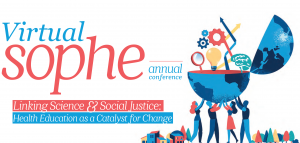May
28

Posted by ssawyer on May 28th, 2020
Posted in: #CC/Academic List, #Health Interest List, #Health Sciences List, #Public/K-12 List, All Members
Jeni Starr, MEd, MCHES
Health & Wellness Specialist
Kansas City Public Library
 While I was making my packing list and travel preparations to attend the Society of Public Health Educators (SOPHE) Annual Conference in Atlanta, GA in March of 2020, the news came that it would be moved from a physical conference to a virtual one. Concerns about the safety of travel with the novel coronavirus infection rate made it necessary to change course.
While I was making my packing list and travel preparations to attend the Society of Public Health Educators (SOPHE) Annual Conference in Atlanta, GA in March of 2020, the news came that it would be moved from a physical conference to a virtual one. Concerns about the safety of travel with the novel coronavirus infection rate made it necessary to change course.
This year’s conference theme of “Linking Science & Social Justice: Health Education as a Catalyst for Change” could not have been more timely. We are seeing in real time the impact of Social Determinants of Health on communities when it comes to COVID-19 cases.
I was impressed by how quickly the conference organizers were able to transition the conference to an online platform and provide extended opportunities for learning and engagement over a four-week period. In the weeks that have followed, many of us in the health information and education field have found new ways of sharing information.
The SOPHE conference was a good example to me of how we can continue to collaborate virtually when meeting in person isn’t an appropriate option. I’ve been able to use this example as I have moved my own programming to virtual platforms and participated in local coalitions.
The conference included many sessions focusing on social justice including:
In my early years as a health educator the primary focus was on individual behavior change. Twenty years later we know that, while behavior is part of one’s health status, Social Determinants of Health such as economic stability, availability of resources, access to education, and social norms play a much larger role.
Attending this virtual conference provided me with tools to bring to my work with the Kansas City Public Library. Now, more than ever, it is important to partner across various sectors to improve the health for all people in our community. There were many takeaways such as CDC best practices for tobacco control, models for sharing messages during a public health crisis, and strategies for working with local elected officials.
Several weeks into the conference, SOPHE presented a session on the coronavirus with information about the virus and illness as well as its impact on African American and vulnerable populations that I was able to incorporate immediately into my work.
When I first learned the conference would take place virtually, I was disappointed that there wouldn’t be as many networking opportunities. However, my disappointment was unfounded. I was able to connect with several of the speakers through email to bring back programming to the library.
For example, I reached out to one presenter, a filmmaker, who was happy to provide a documentary on maternal health for a future film screening at the library. I also learned more about leadership and publishing opportunities with SOPHE and plan to get more involved with the regional and national organization.
This is a time unlike any I have experienced in my career – or even my lifetime. Not only do we have challenges from the new coronavirus, we also have challenges with the virus of misinformation.
As health information professionals, it’s critically important to support the public health of our communities and to share reputable information while working to promote social justice. The opportunity to attend this conference gave me many more tools to do this important work.